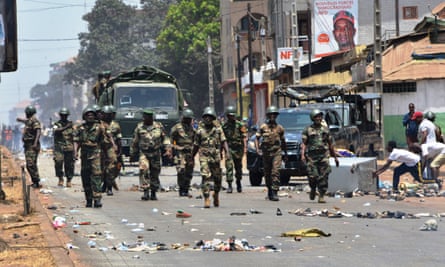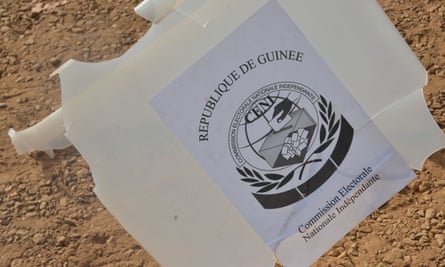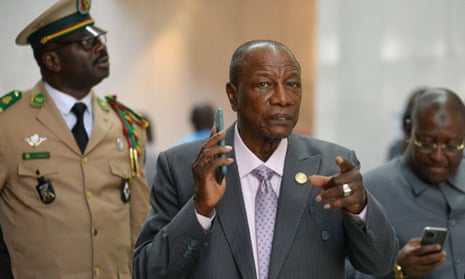Even before the pandemic there were postponements. Before that, there were protests. From a large armchair positioned beneath his own portrait, the 82-year-old president of Guinea is not answering the key question preoccupying his country whether or not he wants to remain in situ until he is 94.
In the Sekhoutoureah presidential palace in Conakry, wearing a short-sleeved shirt and trousers, Alpha Condé is flanked on one side by a large photograph of himself alongside Barack Obama in the White House. On the other, framed photographs on a table show him shaking hands with the Turkish leader, Recep Erdoğan, and with China’s Xi Jinping. There’s also a golden bust of Chairman Mao and a hefty book about the Beninese politician Robert Dossou.
On 22 March, Guinea voted in a referendum on allowing Condé to change the constitution. The electoral commission said almost 92% voted in favour of the changes. At least 42 people died in violent protests that preceded the vote.
The new constitution will enshrine gender parity and wealth distribution in law, ban child marriage and female genital mutilation (FGM), and provide a “specific fund” for young people, women and people with disabilities, Condé says. Critics fear it will also give the president the opportunity to serve two more terms in office.
“I want to give Guinea a constitution which puts it at the vanguard of African countries,” says Condé, who spent decades in opposition before becoming the first democratically elected president in 2010.
The referendum was initially scheduled for 1 March. But with two days to go it was unexpectedly postponed. “Guinea, homeland of pan-Africanism, cannot isolate itself from its fellow countries,” the president told the nation in a sober television address.
The vote finally went ahead on 22 March, but has been mired in controversy. The opposition, who reject the result, have boycotted the electoral register and removed 37 deputies from legislative elections that took place on the same day. After months of violent and peaceful demonstrations, international concern is also high.
Questions have been raised by the International Organisation of La Francophonie (OIF) about the legitimacy of 2.5 million names on the electoral register, and the Economic Community of West African States (Ecowas) and the African Union (AU) withdrew election observers.

Condé is adamant the opposition’s boycott was unjustified. “One cannot block a country,” he says defiantly. “To speak for the people, one must have a mandate from the people.”
The new constitution permits the president to sidestep his two-term limit, and questions linger. Will he now run for president again? And how could Condé – a former law professor at the Sorbonne who was opposition leader for more than four decades who was exiled and imprisoned by dictators, and welcomed as a champion of change by international leaders – consider undermining the still fragile system of democracy that he helped implement?
Before Condé’s arrival, Guinea had a history of leaders outstaying their welcome. Sekou Touré ruled a one-party state modelled on Maoist China from independence in 1958 till he died in office in 1984. His successor, Lansana Conté, was just as tenacious, hanging on, with increasing senility, until 2008. Moussa Dadis Camara, a military captain, then ruled for barely a year, orchestrating elaborate show trials on television before he was shot in the head by an exasperated bodyguard in 2009.
Condé seemed like an improvement. Once condemned to death by Touré and imprisoned for two and a half years by Conté, he was elected with 52.52% of the vote and re-elected in 2015 with almost 58%. But many Guineans are not so much against him as against a third mandate.
Guinea is a country of great natural resources. The coastal area is lush with mangroves and fertile farmland for pineapples, mangoes, rice and potatoes. Inland there are generous deposits of iron ore and Guinea is the biggest exporter of bauxite to China.

But poverty levels are extremely high. Even in the capital, Conakry, the electricity supply is capricious, with frequent power outages. Sometimes there is running water; more often, a trip to the local well. Less than two-thirds of the population can read, and the average income is less than $900 (£727) a year. Guinea also has one of the highest rates of economic migration in Africa. Young people are often unemployed, while 90% of women undergo FGM in some form.
On assuming power, Condé famously remarked that he had inherited a country, not a state. Now he defends his record with reminders of the situation in 2010. “When I arrived, Guinea was on its knees. Completely on its knees,” he says. “We had never completed a programme with the IMF. They called us the ‘basket case’.”
Reforms included an overhaul of the army. There was an attempted coup in 2011. Then there was Ebola. The first case identified was in Guinea in 2013. Three years later, and after more than 2,500 deaths, Guinea was declared Ebola-free.
“I did not have the time to draw up a new constitution,” says Condé.
Under his rule, Guinea has seen undeniable improvements. In 2016 and 2017 the mining industry grew by 50%. The 240- megawatt Kaleta hydroelectric facility should provide Conakry’s residents with stable power. The 450-megawatt Souapiti dam is due to open next year and could provide the energy required for factories.
Refining bauxite into aluminium rather than simply exporting the raw material would add far more to the state’s coffers and in theory trickle down to the population: Anafic, one of the president’s landmark policies, implemented last year, guarantees that 15% of mining revenues will go towards local infrastructure.

Asked if his time in power has changed him, Condé says circumstances remain the same as when he was in opposition. “Since my youth I have wanted to serve my country, and serve Africa,” says the president, who believes he doesn’t get the recognition he deserves. “People in Guinea have a short memory.”
Since October more than 40 people have died in protests organised by the Front National pour la Défense de la Constitution (FNDC), an organisation consisting of civil society, politicians and activists. These have mainly taken place in the district of Ratoma in Conakry, the fiefdom of Cellou Dalein Diallo, one of Conde’s main political rivals. Many of the inhabitants are Peuhl, an ethnic group related to the Fulani. On the day of the vote, 10 people died according to the FNDC (the government says it was six).
“Investigations are happening,” says Condé. He blames tensions on the opposition: “When one doesn’t have a credible political programme, one can lower oneself to the subjective: race or ethnicity.”
But, he says, the tears in the social fabric can be repaired. “It will disappear with the next generation. The more young people have work, the less they will be manipulated.”
Four decades in opposition gave Condé time to nurture a grandiose vision for his legacy. “My mission is to make Guinea one of the most developed countries in Africa. I want the person who comes after me to no longer have to resolve the problems of electricity, nor the problem of water, nor the problem of roads,” he says.
“The countries that develop the fastest – how long have their leaders been in power? I’m not naming names, look at the map.”
The reference is to Rwanda’s leader, Paul Kagame, who was re-elected to a third term in office in 2017 with 99% of the vote.
For all Condé’s ebullience, however, opposition parties and civil society groups are worried by changes granting the president more power and more opportunities to dissolve the national assembly. “They are breaking down the checks and balances on presidential power,” says Alpha Dramé, a lawyer representing the main opposition groups at the Ecowas court of justice.
He argues that the president could have implemented the changes with simple amendments. “The only revolutionary new aspect of what he is proposing is the possibility that term limits no longer concern him.”
Presidential elections are scheduled for November. Other regional leaderswill be looking to Guinea as their own term limits approach.
In his biography, Condé says his best quality is also his worst: frankness. But he refuses to confirm whether he intends to stand for a third term. He used to insist it was the people’s decision. Now he says: “It’s the party who decides.”
He knows everyone wants the answer. In previous interviews, he has pointed out that there are no term limits in countries considered bastions of democracy. “A constitution, a referendum, what is more democratic than that?”
In the country, there is widespread cynicism as to the legitimacy of the vote. As the manager of a restaurant overlooking the fishing port in Conakry puts it: “In elections in Guinea, when you put in ‘yes’, it comes out ‘no.’”
Ecowas, called in to conduct an audit after the postponement of the referendum, has done little to put voters at ease. They confirmed the OIF’s findings that approximately 2.5 million votes are in doubt, cast by people who are either dead, too young or have been counted twice. The coronavirus pandemic meant elections went ahead on 22 Marchwithout international observers. “We don’t know if the voters have been removed,” says Dramé. “There is no guarantee that the recommendations of Ecowas have been respected.”
Condé believes the ballot box is the best way to solve the impasse. Should he stand again for president, his main rivals will likewise be familiar faces. Diallo, leader of the Union of Democratic Forces of Guinea party, and Sidya Touré, head of the Union of Republican Forces, were prime ministers under Lansana Conté. They do not symbolise a fresh start. “They aren’t a new generation of politicians but former civil servants,” says Condé. “I’ve won elections; none of them have.”
On Tuesday, Condé announced a curfew because of coronavirus. So far, the number of cases in Guinea remains low, with fewer than 40 cases.
As the president talks of infrastructure, there is little mention of leaving Guinea with the democratic infrastructure that term limits established.
Forty years fighting in opposition do not seem to have trained Condé in the art of letting go. One thinks of his memoir, in which he was asked about football, one of his great passions. “I would dribble, but never pass the ball,” he answered.
